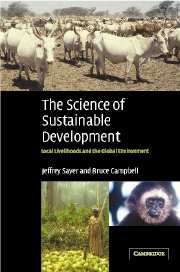Book contents
- Frontmatter
- Contents
- List of figures
- List of boxes
- List of tables
- Foreword
- Preface
- Acknowledgements
- Part I Integrating natural resource management
- 1 The challenge: alleviating poverty and conserving the environment
- 2 Dealing with complexity
- 3 Getting into the system: multiple realities, social learning and adaptive management
- 4 Issues of scale
- 5 Models, knowledge and negotiation
- Part II Realities on the ground
- Part III The research–management continuum
- Bibliography
- Index
5 - Models, knowledge and negotiation
Published online by Cambridge University Press: 18 May 2010
- Frontmatter
- Contents
- List of figures
- List of boxes
- List of tables
- Foreword
- Preface
- Acknowledgements
- Part I Integrating natural resource management
- 1 The challenge: alleviating poverty and conserving the environment
- 2 Dealing with complexity
- 3 Getting into the system: multiple realities, social learning and adaptive management
- 4 Issues of scale
- 5 Models, knowledge and negotiation
- Part II Realities on the ground
- Part III The research–management continuum
- Bibliography
- Index
Summary
Nothing provokes as much controversy in integrated natural resource management as the use and misuse of simulation models. Advocates proclaim the awe-inspiring capacities of computer models. The detractors point to the enormous investments in data gathering to feed models that can rarely, if ever, predict outcomes better than a skilled practitioner. However, in reality we all work with models. Everyone takes decisions on the basis of mental models built up from our knowledge of a resource system and the lessons we have learnt from past attempts to manage it. Computers can be used to formalise these models and to explore the potential impacts of different management interventions. The range of possible modelling approaches runs from simple box and arrow diagrams to help people to share their understanding of linkages in a system through to hugely complex simulation models that aim to predict every permutation of possible responses to policy and management interventions. In this chapter, we review some of the applications of modelling to natural resource management but emphasise that models should be seen as just another management tool whose use is determined by the nature of the problem at hand.
The problems of dealing with multiple objectives and actors, non-linearity, unpredictability and time lags in natural resource systems suggests that modelling will have an important role to play. In this chapter, we focus on the use of various types of model to help with decision making and negotiation.
- Type
- Chapter
- Information
- The Science of Sustainable DevelopmentLocal Livelihoods and the Global Environment, pp. 98 - 116Publisher: Cambridge University PressPrint publication year: 2003



